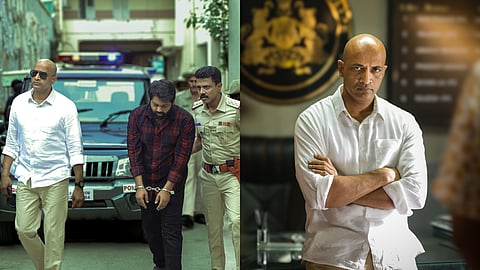

Not every actor can slip into the skin of a police officer with ease. Kishore has, time and again, carried that badge with an authenticity that audiences have come to expect. While he was one of the highlights as a cop in Elumale, directed by Punit Rangaswamy, Kishore once again dons the uniform in Kamal Sridevi. But for him, it’s never just about the badge.
“I don’t see the role in Elumale as a negative role—it was about survival. Even if a story leans into the darker side, it should still leave people with hope. My only insistence in Elumale was that the climax should not end in despair. In cinema, we must always give the audience something to hold on to.”
That philosophy carries into Kamal Sridevi, releasing on September 19. Directed by Sunil VA, the film is produced under Dhanalakshmi’s Swarnambika Pictures, co-produced by Rajavardan under Barn Swallow banner, with him as creative head, and stars Sachin Chaluvarayaswamy and Sangeetha Bhat in the lead. According to Rajavardan, Kishore’s participation went beyond just performing, and Kishore humbly reacted. “Though I’m only an actor here, Sunil and I sat with the script and also had a few discussions with Rajavardan. It is a film about social issues, and it is important how they are woven into the narrative. I felt they could be shaped with more openness. The team was generous enough to listen. Today, the world is full of egos, but when there’s space for discussion, the film gains new perspectives. Sunil was clear about what he wanted to keep, and I respected that. My role wasn’t about interference; it was participation.”
Kishore admits he isn’t the kind of actor who signs films for the sake of visibility. “It takes me a lot of time to say yes. I need to be sure about the subject. When I commit, I keep asking questions. And they would not be about my role alone, but about the film. Ultimately, the product must speak for itself. If I feel a doubt, the audience will also feel it. Why disturb their experience? Logical thinking should go behind every decision.”
Recalling the time he spent on director Gnanavel's Vettaiyan, starring Rajinikanth, Kishore says, “There was no question of my interfering with scripting there. But it was fascinating to watch how Gnanavel would convince Rajinikanth in certain scenes. Rajini sir has such vast knowledge of cinema, and that’s why he is where he is today. I learned a lot just observing those conversations.”
Kishore believes that Kamal Sridevi cannot simply be labelled a 'women-centric' film. “It’s more about society’s perception of women, how they are treated, and how survival becomes their story. We’ve often seen men’s survival journeys in cinema. Here, it’s about a woman navigating suppression, exploitation, and resilience. That perspective is very interesting, especially in our society where mental blocks still exist.”
His character, an investigative officer, serves as the lens through which the story unfolds. But he stresses that the weight of the film lies with its female lead. “Sangeetha is a very sensible actor. Her role is ambiguous. It’s easy to judge, but the actor must bring sensitivity and relatability. I believe she has done that. Finally, it’s effort that counts, and I truly wish her role reaches people in the right way.”
With Kamal Sridevi, Kishore once again blends conviction with craft. For him, every project is an opportunity to push conversations forward, whether about survival, hope, or societal structures.
“I don’t look at films as just acting jobs. They’re conversations with society. As actors, we carry some responsibility in shaping those conversations. For me, the priority is always the film as a whole, not just my part in it,” he concludes.